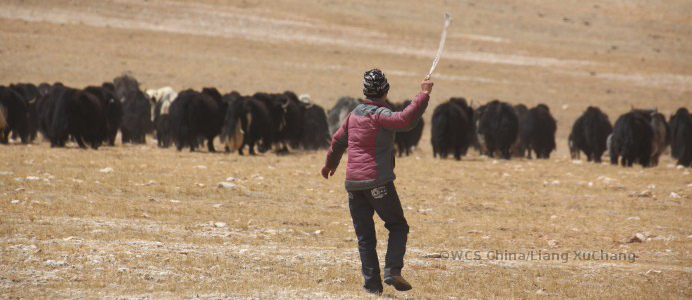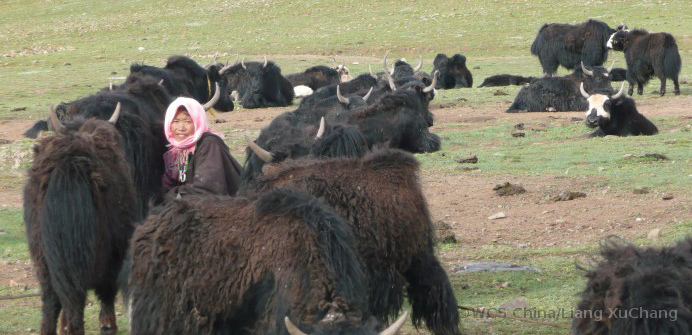
A young herdsman looking after his herd of domestic yaks. ©WCS China/Liang XuChang
It was the lastday we stayed at Garco village, WCS current project site in Naquprefecture. Last summer, over there we set up fences to protectisolated houses and sheepfold from bear raids and thus mitigate theconflict between human activities and wildlife. Our work this timewas to check the status of these fences and assess any need formaintenance. Completed the inspection, our team went to the mostremote place of pasture to interview a herdsman called Pingcuo, whois responsible for the monitoring of domestic and wild Yak conflict.
To reach Pingcuo’s remote pasture there is only a two-hour off-road route. We arrived at his tent when the sky was already getting dark. A young man welcomed us saying that Pingco was out for pasturing the yaks and would be back soon. About one hour later he was back, and since he is able to speak mandarin, we indulged chatting for a while after the technical interview.
Pingco is only 20 years old. After finishing junior high school, he had to give up his studies because his parents required him to return home in order to care after the livestock. He does not feel excited by this kind of herder life. He spends every daytime together with yaks, and every night with his only colleague, eating beef, mutton and zanba (a Tibetan typical staple food) every single day. He feels the frustration of wasting his life this way. One day in the Tibetan grasslands equals to a millennium in the cities where the world changes constantly. A millennium here is just like one ordinary day, because every day looks and feels exactly the same.
While hearing this, I hear Pingco’s friend singing the “Teenager in Pasture” traditional song. “I am walking on the high and rugged plateau / I am a Snowdrop on the iceberg / I am walking in the vast grassland / I am an eagle flying in the sky / I am walking on the wide pasture / I am a Galsang flower on the mountains / I am walking along the origin of the Yarlung Zangbo / I am the prayer flag dancing in the air / We’re the hope of the plateau / we are the teenagers growing up in the hometown of wild yaks.”
“People admire the leisurely and free life of herdsmen. However, if you change your life with the young herdsman, how long you can withstand it? For teenagers who are full of enthusiasm and hope, letting life pass away like this without experiencing all the wonderful things the world has to offer... What a pity!” confesses Pingco.

A lady milking domestic yaks. ©WCS China/Liang XuChang
Pingco promised us to come to the village and hand us the monitoring record forms next day. We were a bit surprised by this proposal. Probably even a trip to the village is a valid way to “escape” to the lively world for him. Pingco has long thought about working in the city, but he is also well aware of the hardships. In Gacuo village the collective economic system is still adopted. The village does not encourage young people to leave the community in seek for a job in order to ensure enough labor force for the survival of the village itself. For those working outside, they are required to pay the village 5000 RMB as compensation every year, which equals to two-three months’ salary for a waiter or labor worker.
WCS has developed a conservation incentive initiative to improve the livelihoods of local inhabitants by diversifying the employment opportunities besides herding in open air pastures where increasingly often domestic herds interfere with wildlife leading to severe resources competition.
Written by: Ji Jishu; Translated by: Tang Ge